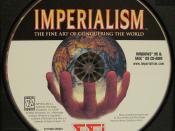Imperialism during the Progressive Era
Imperialism is defined as the policy of extending a nation's authority by territorial acquisition or by the establishment of economic and political domination over other nations. Throughout the time period many people considered Imperialism as another way of reform and Progression. Economics, the military, and the countries nationalism were all ready for the change. This idea of expanding was called the New Manifest Destiny. At this time period, Imperialism was getting very popular, and many began to think that the more land a country annexed, the more powerful it was. Expansionists believed that European countries were already rapidly growing spreading across the globe. Also, they saw that if Americans did not join the imperialism rule, it would end up missing out on power, and may be considered a weaker nation. Imperialism was needed for economic gain and America urgently needed foreign trade, especially with China at this time period.
In addition, The United States was considered to be a great empire and by not showing their strength and power they might be envisioned as a weak nation. At the same rate, many Americans also saw that if the United States started to take other countries by force, it would go against the ideals of our own country. If economic growth occurred, we would need to build and protect our new empires, and this could very easily be a problem. Three presidents at this time period were very influential in their progressive views. One of these was Theodore Roosevelt. "Speak softly and carry a big stick", a quote by Roosevelt himself, expresses his "Big-stick" diplomacy, stating that the threat of military force would be used to influence politics in other countries. Next, Taft's dollar diplomacy states that money can influence decision-making and that America...


